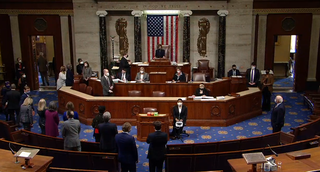In the United States, a presidential transition is the process during which the president-elect of the United States prepares to take over the administration of the federal government of the United States from the incumbent president. Though planning for transition by a non-incumbent candidate can start at any time before a presidential election and in the days following, the transition formally starts when the General Services Administration (GSA) declares an “apparent winner” of the election, thereby releasing the funds appropriated by Congress for the transition, and continues until inauguration day, when the president-elect takes the oath of office, at which point the powers, immunities, and responsibilities of the presidency are legally transferred to the new president.

The 2020 United States presidential election was the 59th quadrennial presidential election, held on Tuesday, November 3, 2020. The Democratic ticket of former vice president Joe Biden and the junior U.S. senator from California Kamala Harris defeated the incumbent Republican president, Donald Trump, and vice president, Mike Pence. The election took place against the backdrop of the global COVID-19 pandemic and related recession. The election saw the highest voter turnout by percentage since 1900, with each of the two main tickets receiving more than 74 million votes, surpassing Barack Obama's record of 69.5 million votes from 2008. Biden received more than 81 million votes, the most votes ever cast for a candidate in a U.S. presidential election.

Anthony Kern is an American politician and a Republican member of the Arizona Senate, representing District 27 since 2023. He previously represented District 20 in the State House of Representatives from January 5, 2015, to January 11, 2021.

Various people and groups assert that former U.S. president Donald Trump engaged in impeachable activity both before and during his presidency, and talk of impeachment began before he took office. Grounds asserted for impeachment have included possible violations of the Foreign Emoluments Clause of the Constitution by accepting payments from foreign dignitaries; alleged collusion with Russia during the campaign for the 2016 United States presidential election; alleged obstruction of justice with respect to investigation of the collusion claim; and accusations of "Associating the Presidency with White Nationalism, Neo-Nazism and Hatred", which formed the basis of a resolution for impeachment brought on December 6, 2017.

Barack Obama's farewell address was the final public speech of Barack Obama as the 44th President of the United States, delivered on January 10, 2017 at 9:00 p.m. EST. The farewell address was broadcast on various television and radio stations and livestreamed online by the White House. An estimated 24 million people watched the address live on television.

President Donald Trump, a member of the Republican Party, unsuccessfully sought reelection in the 2020 United States presidential election. He had been inaugurated for his first term as president of the United States on January 20, 2017, and officially announced his re-election campaign on June 18, 2019.

The first impeachment of President Donald Trump occurred on December 18, 2019. On that date, the House of Representatives adopted two articles of impeachment against Trump: abuse of power and obstruction of Congress. On February 5, 2020, the Senate voted to acquit Trump on both articles of impeachment.

The first impeachment trial of Donald Trump, the 45th president of the United States, began in the U.S. Senate on January 16, 2020, and concluded with his acquittal on February 5. After an inquiry between September and November 2019, President Trump was impeached by the U.S. House of Representatives on December 18, 2019; the articles of impeachment charged him with abuse of power and obstruction of Congress. It was the third impeachment trial of a U.S. president, preceded by those of Andrew Johnson and of Bill Clinton.

From 2017 through 2021, Donald Trump was the 45th president of the United States; he is the only American president to have no political or military service prior to his presidency, as well as the first to be charged with a felony after leaving office. He is regarded by historians as one of the worst presidents in U.S. history.

The inauguration of Joe Biden as the 46th president of the United States took place on Wednesday, January 20, 2021, marking the start of the four-year term of Joe Biden as president and Kamala Harris as vice president. The 59th presidential inauguration took place on the West Front of the United States Capitol in Washington, D.C. Biden took the presidential oath of office, before which Harris took the vice presidential oath of office.
Transition Integrity Project (TIP) was a series of political scenario exercises in the United States at the beginning of June 2020, involving over 100 current and former senior government and campaign leaders, academics, journalists, polling experts and former federal and state government officials. The exercises examined potential disruptions to the 2020 presidential election and transition. TIP is not an organization, but rather a short-term project run under the auspices of the organization Protect Democracy.

The following is a timeline of the presidency of Donald Trump during the fourth and last quarter of 2020, from October 1 to December 31, 2020. This is also during the final month of his presidency from January 1 to 20, 2021, when Trump left office. To navigate quarters, see timeline of the Donald Trump presidency.
The Biden–Ukraine conspiracy theory is a series of false allegations that Joe Biden, while he was vice president of the United States, improperly withheld a loan guarantee and took a bribe to pressure Ukraine into firing prosecutor general Viktor Shokin to prevent a corruption investigation of Ukrainian gas company Burisma and to protect his son, Hunter Biden, who was on the Burisma board. As part of efforts by Donald Trump and his campaign in the Trump–Ukraine scandal, which led to Trump's first impeachment, these falsehoods were spread in an attempt to damage Joe Biden's reputation and chances during the 2020 presidential campaign, and later in an effort to impeach him.

Members of the United States Republican Party have reacted differently to Republican president Donald Trump's false claims about the 2020 United States presidential election, with many publicly supporting them, many remaining silent, and a few publicly denouncing them. Trump falsely claimed to have won the election, and made many false and unsubstantiated claims of election fraud. By December 11, 2020, 126 out of 196 Republican members of the House backed a lawsuit filed in the United States Supreme Court supported by nineteen Republican state attorneys general seeking to subvert the election and overturn the election results. The Trump campaign hired the Berkeley Research Group to investigate whether there had been voter fraud. The researchers found nothing, and the consultancy reported this to Trump and his chief of staff Mark Meadows on a conference call in the final days of the year, before the attack on the Capitol.

The 46th and incumbent U.S. president Joe Biden has seen multiple efforts by some members of the Republican Party to impeach him. An impeachment inquiry into Biden was launched in September 2023, without a vote, by House Speaker Kevin McCarthy, who designated three House committees led by James Comer, chairman of House Committee on Oversight and Accountability. A number of prominent Republican lawmakers, along with Donald Trump and some of his political allies, have indicated the motivation behind efforts to impeach Biden is also driven by resentment over Trump's previous two impeachments.

Donald Trump, the 45th president of the United States, was impeached for the second time on January 13, 2021, one week before his term expired. It was the fourth impeachment of a U.S. president, and the second for Trump after his first impeachment in December 2019. Ten Republican representatives voted for the second impeachment, the most pro-impeachment votes ever from a president's party. This was also the first presidential impeachment in which the majority caucus voted unanimously for impeachment. Trump was indicted on August 1, 2023, for the conduct for which he was impeached.

The second impeachment trial of Donald Trump, the 45th president of the United States, began on February 9, 2021, and concluded with his acquittal on February 13. Donald Trump had been impeached for the second time by the House of Representatives on January 13, 2021. The House adopted one article of impeachment against Trump: incitement of insurrection. He is the only U.S. president and only federal official to be impeached twice. He was impeached by the House seven days prior to the expiration of his term and the inauguration of Joe Biden. Because he left office before the trial, this was the first impeachment trial of a former president. The article of impeachment addressed Trump's attempts to overturn the 2020 presidential election results and stated that Trump incited the attack on the Capitol in Washington, D.C., while Congress was convened to count the electoral votes and certify the victory of Joe Biden and Kamala Harris.

The 2024 United States presidential election in New Hampshire is scheduled to take place on Tuesday, November 5, 2024, as part of the 2024 United States elections in which all 50 states plus the District of Columbia will participate. New Hampshire voters will choose electors to represent them in the Electoral College via a popular vote. The state of New Hampshire has four electoral votes in the Electoral College, following reapportionment due to the 2020 United States census in which the state neither gained nor lost a seat.

The 2024 United States presidential election in Utah is scheduled to take place on Tuesday, November 5, 2024, as part of the 2024 United States elections in which all 50 states plus the District of Columbia will participate. Utah voters will choose electors to represent them in the Electoral College via a popular vote. The state of Utah has six electoral votes in the Electoral College, following reapportionment due to the 2020 United States census in which the state neither gained nor lost a seat.












